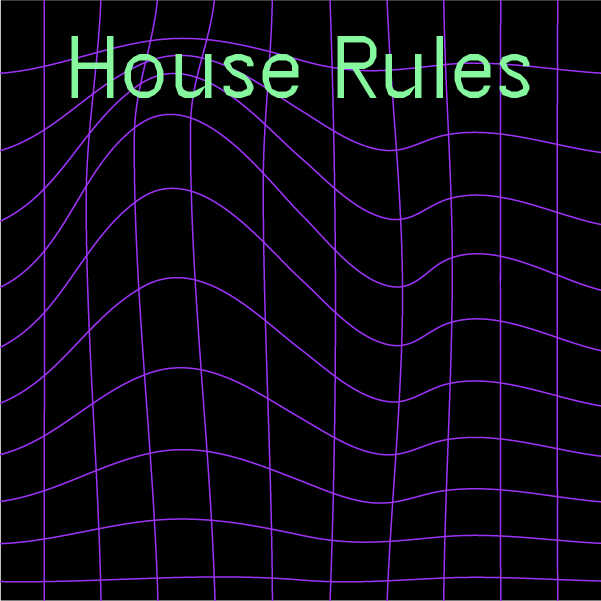House Rules
I. Introduction
The following refers to house rules for events organised by Design Academy Eindhoven. These house rules apply to all event stakeholders including event guests, event staff, speakers, event producers and other relevant parties who contribute to events in any shape or form. The organised events may take place online or physically on the premises of Design Academy Eindhoven or elsewhere. All event stakeholders, as mentioned in the Definitions section of the house rules, are responsible for ensuring a welcoming, trusting and respectful event experience. Therefore, a certain behaviour is expected and encouraged. Should any of the above-mentioned stakeholders fail to follow the house rules, event staff and/or event producers will take action, as outlined bellow, in section VI.
II. Definitions
The following terms are repeatedly used in the DAE house rules for events and are therefore defined as follows:
→ Event guests: event participants, with or withour registration
→ Event staff: If applicable, the event staff might include, among others, students, employees from educational departments or other external parties such as technical staff
→ Speakers: External or internal stakeholders who are specifically invited to speak on the occasion of an event. Their contribution appears on the event program.
→ Event producer: One or several employee(s) responsible for the organisation of the event on behalf of DAE
→ DAE onsite personnel: concierges, reception staff, cleaning staff
III. Differences between online and physical events
While in principle the concept may be similar, the character of events can vary wildly depending on whether they take place in an online environment or at a physical location. As a rule, both appropriate and inappropriate behaviour displayed during or after an event is categorised in the same way and considered with the same level of importance. The biggest difference resides in how event guests or participants are reprimanded following undesirable behaviour.
IV. Appropriate behaviour
By appropriate behaviour, it is understood that all event attendees show certain behavioural characteristics that are deemed desirable, positive and that overall contribute to a pleasant event experience for all present people. A non-exhaustive list of these behavioural characteristics and examples is provided below:
→ Kindness towards fellow event guests & staff. Example: Greeting the person sitting right next to you;
→ An open attitude towards people with backgrounds, languages and experiences that are different than ours and keeping potential biases in check. Example: Listening when others express their perspectives on a topic without interrupting, and acknowledging the value of others’ opinions, especially when they differ from our own;
→ Showing appreciation for the event/ programme developed specifically for event guests. Example: Reflecting about the curation of an event’s programme in relation to content and structural elements such as the diversity of speakers’ backgrounds, expertise and professional experience;
→ Expressing remarks, suggestions for improvement and/or complaints regarding the event in a thoughtful, constructive, and respectful manner. Event staff will ensure event guests feel welcome to share their experience after the event is finished. Example statement: “Thank you for organising this lecture, it was very inspiring. However, I would recommend an earlier starting time in the future since the event takes place on a weekday. In the future, I might not be able to attend because of work engagements.”;
→ Following venue rules as communicated before and during the event. In case of a physical event, the onsite/venue rules concerning opening times, emergency and evacuation procedures, etc, apply. Example: After an event, guests leave the building on time, as communicated by DAE onsite personnel.
V. Inappropriate behaviour
By inappropriate behaviour, it is understood that all event attendees show certain behavioural characteristics that are deemed undesirable, negative and that overall hinders a pleasant event experience for all other event attendees. A non-exhaustive list of these behavioural characteristics and examples is provided below:
→ Mocking speakers’ discourse or narrative. Example statement: ‘’Your ideas are stupid’’;
→ Hateful, offensive, or discriminatory speech towards event guests or event staff;
Damage of facilities and/or equipment on site;
→ Disrespecting the event format and programme. Unless otherwise mentioned by the event organiser, the event follows a fixed programme that cannot be changed upon guests’ requests. Example statement: ‘’Can’t we just move the following talk to the end of the day and extend the break?’’.
VI. Consequences in case of undesired behaviour
Physical events
In case of inappropriate behaviour shown by either the event guests or staff, the events producer will directly intervene and liaise with the offender or person responsible for the inappropriate behaviour. The event producer will explain that the displayed conduct is not tolerated and warn that if it happens again the person will have to leave the premises and (potentially) be refused entrance and participation in future events at DAE.
Online events
Should event staff or event guests engage in inappropriate behaviour during an online event, the events producer or an online moderator will directly take action. This person will halt the event in order to liaise with the offender or person responsible for the inappropriate behaviour. The event producer will explain that the displayed conduct is not tolerated and warn that if it happens again the person will be immediately removed from the online meeting (or streaming session) and potentially banned participation in future events organised by DAE.
VII. How to report inappropriate behaviour during & after an event
Event guests can report an incident directly to the events producer or events staff while the event is taking place. After the event has taken place, those who attended an event can contact the Communications, Presentations and PR department of DAE under the e-mail address communications@designacademy.nl or DAE’s Events Producer Loreto Bazo through loreto.bazo@designacademy.nl.
